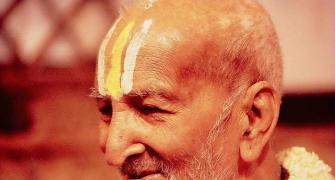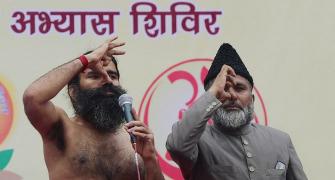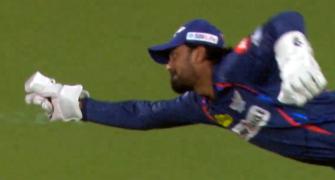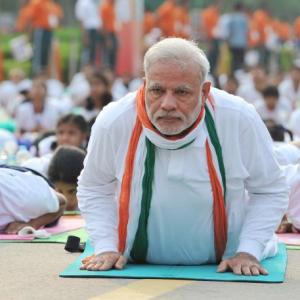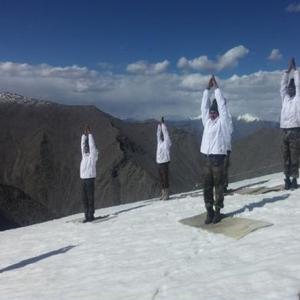India needs to build its Grand Narrative, and its cultural power needs to be forcefully projected while simultaneously hard economic and military power are also emphasised, says Rajeev Srinivasan.

I write this on the eve of #InternationalYogaDay, and I have been watching a lot of chatter on my Twitter timeline about it. There seem to be, at least in my limited acquaintance, two distinct camps: one group that is delighted that yoga is getting to be seen as more than mere physical exercise, and the Indian/Hindu connection is being revived. They see India’s soft power rising.
The second group is outraged at what it sees as the Indian government Hindu-ising what is essentially a heritage of mankind, which should have nothing to do with religion or spirituality. They are the ones who point out, with delight, how some pious Muslim nations have opted out of the celebrations. Some go so far as to take umbrage at what they claim is the government forcing certain disciplines down their throats.
There is a third group too: it argues about whether the word is actually yog, yoga, or yogaa. I admit that I participated in a long argument about the effects of languages like Persian on the development of apabhramsa or creolised tongues, and how their impact has or has not affected the Hindi pronunciation. (In case you are wondering, by Sanskrit rules, it is yoga,  phonetically ,with the final syllable being the 'schwa', or half-pronounced semi-vowel, as in about, driver etc. That is, it's not the abrupt yog, or the elongated yogaa.)
phonetically ,with the final syllable being the 'schwa', or half-pronounced semi-vowel, as in about, driver etc. That is, it's not the abrupt yog, or the elongated yogaa.)
Going back to the first group, it consists of those who consider themselves patriotic, not surprisingly. Some of them are perhaps a little touchy, partly because they have seen all sorts of Indian cultural artifacts being genericised and claimed by others. They feel that even at this late stage we must protect what is genuine intellectual property and innovation from India.
Alas, India has been robbed of an enormous amount of its intellectual creations because of outright theft and by Western prejudice that all civilisation must have come from Greece and Rome, and couldn’t possibly have come from India. This list is long, and suffice to mention the infinite series for trigonometric functions discovered by Madhava, which the West has dubbed the Taylor and Maclaurin series. Similarly, astronomy staples such as the constellations were likely Indian concepts, but they have been declared to be of Greek origin by (unconsciously) prejudiced Westerners.
The first group are the people, cultural nationalists, who rejoiced the most at Narendra Modi’s emphatic win last year. They are delighted that under this PM, India’s profile has risen, and they see nothing wrong in asserting ownership of what is indubitably ours in origin. The fact is that, in the intellectual property regime that prevails via WTO, WIPO etc, it is imperative to assert claims lest they be stolen.
This group also sees the value in soft power and propaganda. There is the instructive case of China, which has managed to assert its ownership of things that it has no historical claim to (as in the case of Tibet, and parts of the South China Sea) using dubious and fabricated history. In addition, Western collaborators such as Joseph Needham have written large volumes on Chinese science, quite generously ‘awarding’ a lot of Indian science and technology to the Chinese! This has now become ‘truth by repeated assertion’.
What we are seeing is the triumph of propaganda. There is clearly value in a narrative that can be sold to large numbers of people. For instance, there has been a recent spate of articles about the Rohingya boat people, with The Economist going so far as to ask if they were the most persecuted people (external link) in the world. Very fine sentiment about desperate boat people, except that it was a nice tactic to divert attention away from the fact that equally desperate boat people were being turned away from Europe, after suffering horribly mostly as a fallout from Western actions: invasions, and before that, redrawing of boundaries.
Startlingly, on Quartz, a former NY Times stringer in India wrote an article (external link) making Modi (and Xi) responsible for rescuing the Rohingyas. This is quite bizarre considering that the Rohingya issue has nothing whatsoever to do with India.
On the other hand, there was nothing in any of the Western media about the truly most oppressed people in the world, such as the #Roma in Europe, the #Yazidi in Iraq/Syria, or the #Tibetans. The Roma have been brutalised for close to a millennium, and here comes this new poll: they are the most hated people in Europe; no wonder they have practically no human rights. There has been practically no comment on it.
Let us also note that the top three hated groups are all generally non-white, so that Europe’s vaunted racial tolerance is really just a smoke screen for racism. The fervid publicity for Rohingyas hides their own centuries-old hatred for Roma, people of Indian origin who may well be escapees from the slave trade of Indians in the bazaars of Afghanistan after the invasions of the Ghoris and Gaznavis:
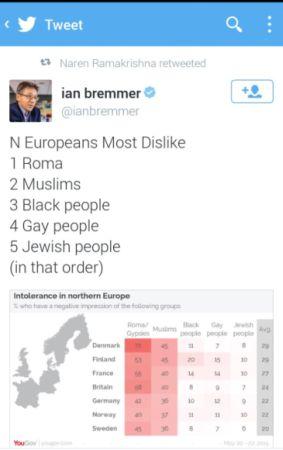
Similarly, the Western media is very vocal about #InternationalYogaDay, and spares no effort to diminish it. There have been a number of articles in various Western outlets essentially dissing India/Hinduism and yoga, and declaring that there is hardly any connection between the two. Not surprisingly, it is the same memes that we have heard from the Indian group of doubters, so that there’s the likelihood that they’re all singing from the same hymn book. They share similar strategic intents, of course. Here’s a tweet from the Financial Times:
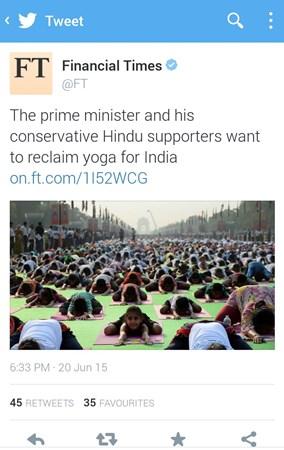
And exactly what is wrong if India wants to reclaim her heritage? I noticed that the British exerted themselves mightily to celebrate the 800th anniversary of their charter, the Magna Carta, just a few days ago. This is supposed to be a quasi-sacred document that gave the world democracy, although in reality it is no such thing, and, for instance the Uttamerur inscription (external link) in Tamil Nadu shows a flourishing village democracy 300 years earlier. Even so, there’s nothing wrong if Brits claim their patrimony, but the FT seems to think it inappropriate for Indians to do so.
This brings us to the whole issue of asserting soft power. India has not done so well at it. But its rivals have huge networks: for instance the Americans have propaganda magazine SPAN and Voice of America, and for all practical purposes the New York Times, he Wall Street Journal, he Atlantic, and all of Hollywood and Silicon Valley. All these project a positive image of the US. The BBC and British papers such as the Economist, the Financial Times, the Guardian, etc go with the US programme when it comes to non-white nations, although they may have intra-Anglophone quarrels.
The Soviets used to have Soviet Land etc, now their heirs the Russians run Russia Today, apparently a fairly sophisticated outfit with both web and TV operations.
China, along with the rise of its hard power, has assiduously built up a network, including Global Times, Asia Times, Xinhua and other properties, plus they have bought up a series of editors, including those of what is now ‘China’s national newspaper’ in India.
The Arabs have a slew of newspapers, as well as the rapidly expanding Al-Jazeera, now a formidable operation with outlets in the US as well, and enough money to buy good staff and build up a franchise.
So where is India’s answer to all this? It’s true that we first have to construct a narrative of ‘Indian exceptionalism’ or ‘Hindu exceptionalism’ along the lines of the ‘Protestant Work Ethic’ and the ‘Confucian Work Ethic’. I made a small start about the ‘Hindu Work Ethic’ (external link) 20 years ago, but the narrative hasn’t taken off, mostly thanks to earlier governments deliberately limiting the hard power needed to support the soft power.
There is Prasar Bharati, of course, under the dynamic Surya Prakash, but it isn’t enough. At the moment, it’s all it can do to keep the mala fide MSM in check, but clearly an overseas operation needs to be mounted. An example is Voice of America broadcasting from the Seychelles, and Radio Free Europe blasting away from various places on the periphery of the Soviet Union.
#InternationalYogaDay is a very good beginning -- but it is only a beginning. India needs to build its Grand Narrative, and its cultural power, which conquered all of ASEAN (then known as Indo-China), needs to be forcefully projected while simultaneously hard economic and military power are also emphasised.
The Germans have their Goethe Institutes, the French their Alliances Francaise, the British their libraries, the Americans their lavish consulates, and the Chinese the Confucian Institutes. India needs to create its Patanjali Yoga Institutes as well to maintain the momentum.


